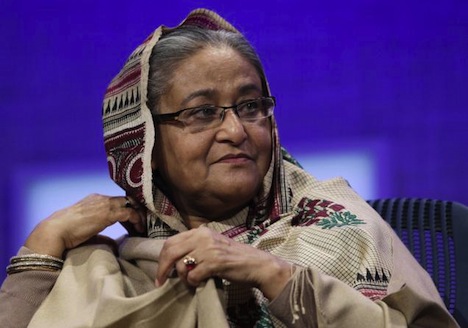1. Bangladesh parliamentary elections, January 5 (and perhaps again, later in 2014).![]()
Bangladesh is home to 155 million people, making it the eighth-most populous country in the world. When voters go to the polls just after the New Year, however, it’s certain that the governing Bangladesh Awami League (বাংলাদেশ আওয়ামী লীগ) and prime minister Sheikh Hasina (pictured above) will win reelection. That’s because the opposition Bangladesh Nationalist Party (BNP, বাংলাদেশ জাতীয়তাবাদী দল) is boycotting the vote, largely over Hasina’s refusal to appoint a caretaker government to oversee the election’s administration.
The most relevant precedent is 1996, when the BNP’s leader, Khaleda Zia, was prime minister and Hasina and the Awami League were in the opposition. The Awami League boycotted the February 1996 elections and the BNP won all 300 seats in the Bangladeshi parliament, but the parties eventually came to a deal on fresh elections, and both parties participated in the subsequent June 1996 elections.
Though the players are chiefly the same — the Zia/Hasina rivalry has influenced the country’s politics since the 1980s — the stakes have grown much higher. Hasina established the International Crimes Tribunal in 2009 to prosecute the war crimes related to the brutal 1971 war for Bangladesh’s independence from Pakistan. When the ICT sentenced Islamist leader Abdul Quader Mollah to life imprisonment, protesters came out in droves to Shabagh Square in Dhaka in early 2013 to contest the sentence as too lenient. The government relented, executed Quader Mollah in December and banned the Islamist Jamaat-e-Islami (বাংলাদেশ জামায়াতে ইসলামী), even though it’s never galvanized widespread support in Bangladesh. That, too, caused protests and Quader Mollah’s execution brought international condemnation on Hasina’s government. The protests on both sides have demonstrated that the wounds of 1971 are far from healed. The opposition has conducted a general strike that’s threatening the economy, and Hasina has found herself increasingly isolated.
Photo credit to The Hindu.

One thought on “14 in 2014: Bangladesh parliamentary elections”